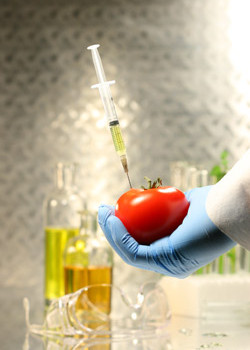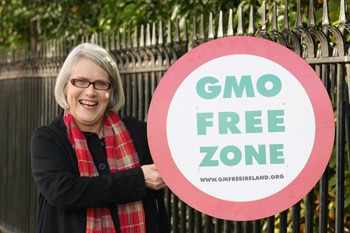Frankenstein foods or farming superheroes?

Does using genetically modified (GM) crops represent a smart way to keep costs down or will experimentation in this field exert a far more monstrous price upon Ireland’s wholesome food reputation? Gillian Hamill speaks to anti-GM campaigner Stella Coffey
11 May 2012
The decision made by Morrison’s supermarket in the UK to stock poultry fed on genetically modified (GM) feed within its stores, has once again brought the debate surrounding GM foods into the spotlight.
When ShelfLife contacted the supermarket, it appeared unconcerned about a potential backlash however, stating that the move would help its suppliers keep their cost base in check. A spokesman said: “We know that the cost of feed is the major item of expenditure for most livestock farmers. Uniquely, poultry farmers have faced restrictions on the use of GM feed, but this policy will be increasingly difficult and costly to maintain as the availability of non-GM protein (namely soy) decreases.
Managing food inflation?
“We are moving to permit the use of GM feed in the poultry supply chain and are strengthening the focus on sustainability, for example through the increasing use of certified sustainable soy. We have communicated our decision to the poultry farmers that supply Morrisons.
“This move will also allow us to manage food inflation and keep costs down for customers.”
While the price argument is one that undoubtedly resonates with many consumers, there are those who have thought much more deeply about the potential side effects of GM crops being used within the food supply chain. One such person is Stella Coffey, a grandmother, who concerned about the implications of GM crops and food for her “growing brood,” decided to take action. She therefore established a petition in a bid to persuade the government to introduce a five-year moratorium on growing GM crops and food in Ireland because not enough is yet known about GM crop effects. Impressively, the petition which can be viewed and signed at www.gm-moratorium.com, currently has almost 1,900 signatures. ShelfLife decided to get in touch with he campaigner to find out more about her motivation for setting up the petition and its progress so far.
ShelfLife (SL): Why did you decide on five years for a moratorium period – do you think significantly more research on the effects of GM food will come to light during this period?
Stella Coffey (SC): Simply, I thought a five-year period was a reasonable amount of time. It is not just a matter of research that might be done during this period. It is also the processes needed to get people to the point where there ultimately can be a well-informed discussion on GM crops – and related issues. Some very basic stuff needs to be sorted out not least of which is the ability to distinguish between science itself and technology, and their respective roles.
The information landscape on GM crops has changed a lot in the last six years. Some conclusions that were reached in 1992, 1999 or 2003 about GM technology and GM crops have now been de-bunked or superceded. This is the nature of science – a widely accepted hypothesis or theory is proved to be inaccurate and a new hypothesis or theory has to be constructed to fit the available knowledge and evidence. However, regulatory science is an entity that, while derived from research science, has become instrumentalised as a tool to support economic development. Economic development that undermines the biological basis of life itself should be re-named as developmental destruction, or some variation thereof!
SL: How would you respond to those who say that we must embrace GM technologies in order to help feed a growing world population and farmers who say it represents a more cost-effective solution?
SC: There is now a growing body of evidence that smaller farms are more efficient than mega-farms, that low-input farming working with nature can increase yields and address food security. One small-scale farm system can yield two to six times that of conventional US agriculture and has produced up to 31 times the US yield. It seems to me that applying 21st century knowledge to produce nutrient-dense food in a sustainable, human-friendly and earth-friendly way is a much more desirable way to feed the world than by embracing genetic engineering of our food crops.
Anyone who claims GM represents a cost-effective solution is repeating the error made by industrial farming, ie, ignoring the externalities, and ignoring the impact of that mining-style of farming on our environment. The externalities are those costs allocated beyond the balance sheet but paid for by taxpayers to clean up run-off to our water supply, and mop up other industrial food messes. Externalities are also paid for by future generations in terms of soil erosion, resource depletion, compromised environment and health impacts.
These farmers who say GM represents a more cost-effective solution – where are they? Paul Hawken (of ‘Natural Capitalism’ and ‘Ecology of Commerce’ fame) describes farmers as being under such pressure from poor prices that they are “highly susceptible to a crop, a seed, a product that will slightly reduce their costs even if the long term affect is detrimental to the soil, to themselves, even to their family. You see it in India, you see it in America, you see it in Canada, you see it in Argentina”. Hawken is re-iterating what farmers around the world know in their gut: too many layers of profit-makers operate on the back of the food that farmers produce, while farmers often cannot cover their costs of production. Governments sometimes react to this basic farmers’ dilemma through price support, intervention buying and other tinkering around the problem. Of course it wouldn’t suit all those layers of profit-makers for farmers and other primary food producers to be paid a fair share for their produce. While I don’t know the answer to farmers’ dilemma, I do know that any notions of cost-effectiveness have to include all costs – including externalities, and including those paid by future generations.
SL: The chief scientific advisor to the Irish government, Professor Patrick Cunningham, has said that scientific evidence has overwhelmingly shown that food derived from GM crops or from animals fed on GM feed is safe. Is this a credible viewpoint?
SC: In Ireland we’ve learned the hard and painful way about a phenomenon called Regulatory Capture. It happened in the financial and banking system when the regulators became infused with the concerns of the regulated while ignoring the public and national interests. Regulatory Capture isn’t unique to Ireland or to the financial or economic system. One commentator has described GM food as the Anglo Irish Bank of the food system. Regulatory Capture has infected the GM regulatory system right from the start. In the 1980s, the shots were called by the biotech industry, the politicians danced to their tune, and the scientists were so hell bent on minimising political and public interference in their work, that they insisted on their overarching right to pronounce on scientific matters.
Significant parts of the scientific evidence about GM crops and animals fed on GM feed are based on incorrect assumptions. My own sense of our state of knowledge, never mind scientific evidence regarding genetics, biology and ecology, is we don’t know enough, and we ought to at least acknowledge what we don’t know. Somehow regulatory science has forgotten good science principles and so Professor Cunningham’s viewpoint just isn’t credible.
You know, it is chilling to read how the words ‘no evidence of harm’ became perverted to ‘evidence of no harm’ regarding GM crops and food. It’s all on the public record – actually the US Federal record – from the 1980s onwards. This perversion/corruption is a fundamental flaw in the GM regulatory system, a flaw that has been built on repeatedly for almost 30 years. It was been repeated so often it’s accepted as fact. Ally this flaw with the incorrect one gene-one protein assumption on which genetic engineering is based and the shakiness of the ground becomes more obvious. These are the grounds on which credibility of GM evidence must be tested.
SL: Would you be less concerned about people consuming meat from animals fed on GM feed compared to humans eating GM foods directly, as there is a less direct link involved?
SC: The basis of my problem with GM crops and food is that GM crops are grown in fields with their pollen and seeds dispersed freely into the surounding area, and the organisms in the crop’s biosphere interact biologically with the GM crop, eg, the microbes in the soil in which the GM plants grow. GM plants are proven to have unpredictable effects. If one of these unpredictable effects causes a negative impact in the field or when fed to animals or humans, it will not be possible to recall those plants, which by their very nature can be merrily reproducing themselves every season. This classic Pandora’s Box scenario is not reversible.
SL: Do you think the issue of GM food is something that Irish consumers are more aware of generally than consumers in other countries?
SC: I think the awareness of GM food is lower in Ireland that many other EU countries. The Irish media have been just so negligent in dealing with the GM issue. The Irish Times appears to have been heavily influenced by a strongly pro-biotech genetics professor, who was a board member of The Irish Times Trust for years. Environmental issues in the Irish media tend to be limited to the built environment. Most Irish media commentators appear to be both biologically and eco-illiterate.
The UK had a major public consultation in 2003 so more people there are somewhat more aware. Germans tend to favour organic food while French and Italians have a passionate connection with their food and where it comes from. However, the low level of GM food awareness in the US is remarkable but this may change now as there is a major GM labelling campaign underway there, something that was seemingly promised by Obama before his election but not delivered on.
GM FOODS: The opposing viewpoints
Speaking on Teagasc’s application to the Environmental Protection Agency for a licence to conduct research on GM “blight-resistant” potatoes, made in March 2012:

Kevin Myers
Kevin Myers, Irish Independent columist: If the entire world were to take [Feargal Quinn’s] example and ban GM foods, then sooner or later we should have a catastrophe that could dwarf the Ukrainian Famine, the Chinese Famine and the Bengal Famine.

Eddie Downey
Eddie Downey, deputy president, IFA: Farmers respond to market signals and the evidence is that the great majority of consumers are unwilling to pay any premium for products produced using GM-free feed. The GM-free market is a very small niche market and the experience is that any premium achieved is rapidly eroded as supply increases.

Darina Allen
Darina Allen, Chef and founder of Ballymaloe Cookery School: The perception of Irish produce in the US as in many other countries is of wholesome, clean food they can trust. Why would we want to lose our precious clean green image on which so much depends when there are already several varieties of blight resistant potatoes that could be further developed instead?



 Print
Print






Fans 0
Followers